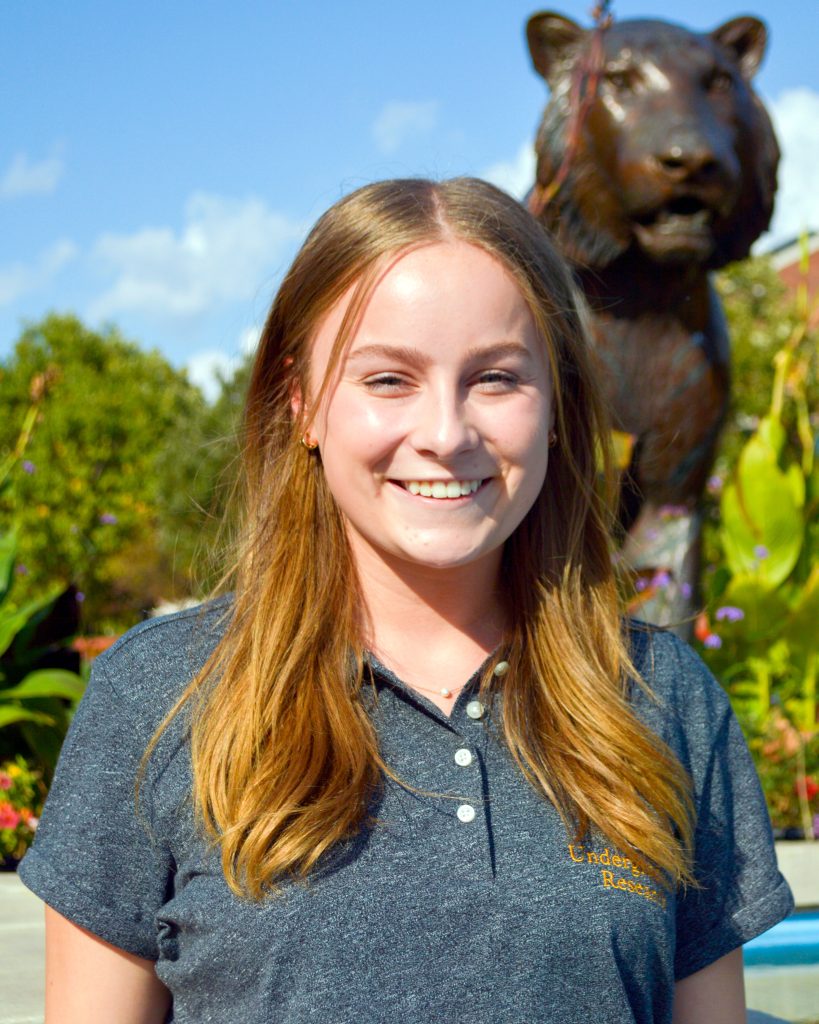Oct. 26, 2022
By Gracie Hedenberg
If there is one thing Morgan Linneweh, a junior and student researcher in Speech, Language and Hearing Sciences, would tell her freshman self, it would be to embrace her mistakes because that’s how to learn. And Linneweh has learned a lot since she first stepped foot into Dr. Mili Kuruvilla-Dugdale’s Neurogenic Communication Disorders Laboratory her freshman year, including research terminology, how to analyze data from lip, tongue and jaw sensors, and the connections she can make within MU.

For about six hours a week, Linneweh works in her lab reviewing charts, analyzing speech errors and determining sentence intelligibility of participants with communication disorders caused by neurodegenerative diseases such as Parkinson’s and ALS. Linneweh plans to become a speech pathologist after she graduates with her master’s, and she is currently collaborating with another student on an undergraduate thesis in SLHS based on her lab experience.
She started, handpicked from an introductory SLHS class, in her lab of primarily juniors and seniors. Her peers had completed more SLHS classes and had been involved in research longer than Linneweh had been in college, which gave them a leg up on the research vernacular and important terms. But that did not deter Linneweh; she gained self-confidence through practice, asking questions and dedicating time. She began asking her peers and mentors more questions and got more involved both in her lab and elsewhere on campus.
When she applied to be a peer ambassador in the MU Undergraduate Research Ambassador program, she only knew she wanted to connect with others to encourage them to engage with the opportunities around them.
“I knew there were a lot of different student ambassador programs for different majors and programs.” she said. “Research has helped me grow as a person, and I wanted to be able to convey that to other people so I just Googled ‘student ambassador Mizzou,’ and I was drawn to the undergraduate research ambassador program because I’ve had such a unique, hands-on experience with research.”
As a peer research ambassador, Linneweh gets to discuss her research, which she says is the most influential thing she’s been involved in at MU, and she encourages other undergraduate students to seize the opportunities available to them so they can grow the same confidence and network that she has.
“When I joined my lab, confidence was really the thing I lacked and what I really struggled with,” Linneweh said. “As a research ambassador, I want to be able to connect with people and tell them they can grow their confidence. It’s important to be self-confident in both research and everyday life, and I know building that confidence through research changed who I am.”
Research opportunities are available for students from all disciplines, so long as they seek it out. Linneweh says peer ambassadors can influence other students to get involved more easily than professors or faculty because they are approachable and understand the student experience first-hand. Her team of peer ambassadors meets with student groups around campus to show them that research is exciting and more available than they may think.
“There’s so much out there in research, and there’s so much potential for research; you could come up with any topic and be able to research it, which is really cool,” Linneweh said. “Meeting new people and hearing their experiences can also help you talk about your own in a better way. And even if you don’t want to join research, just reach out to faculty in your department to expand who you know and make those connections. Meeting people can lead you to really good opportunities.”